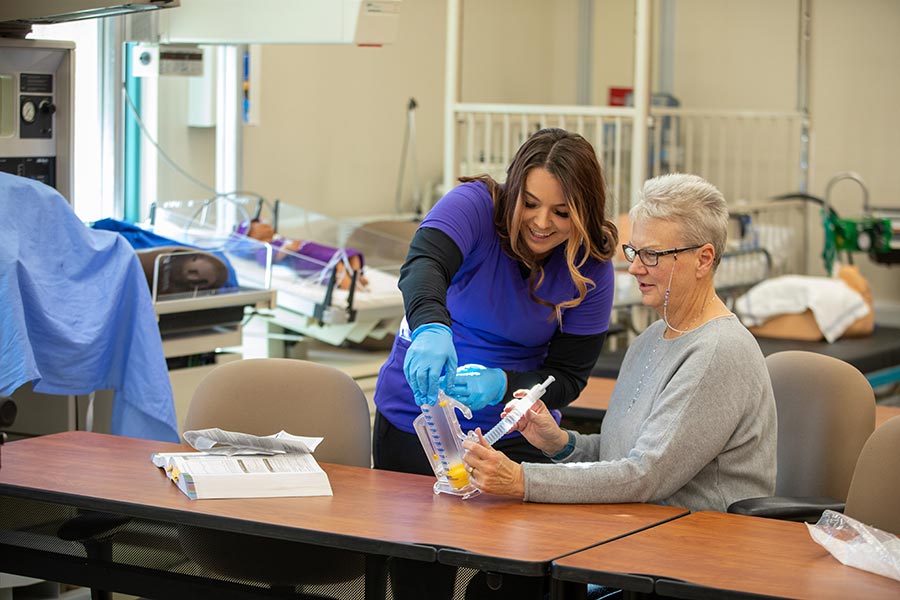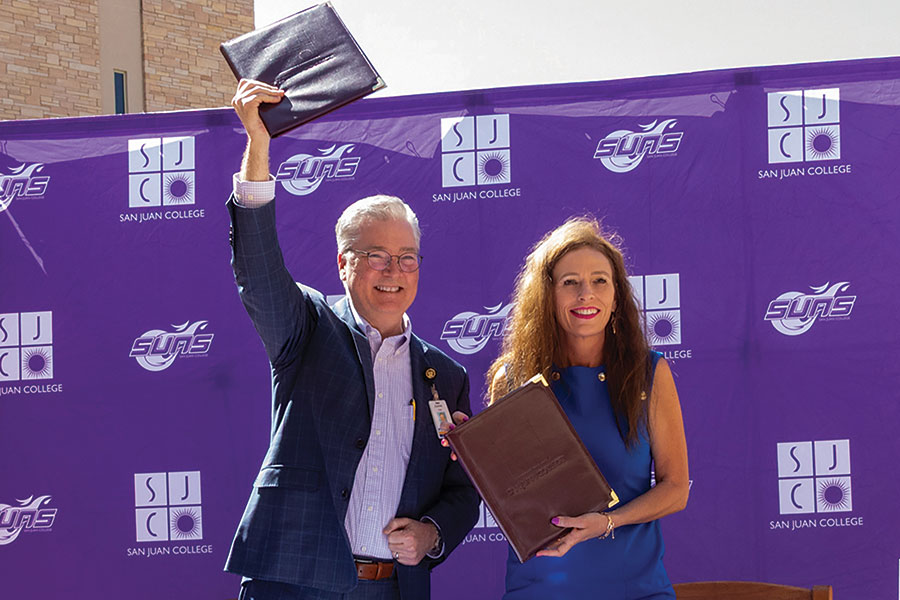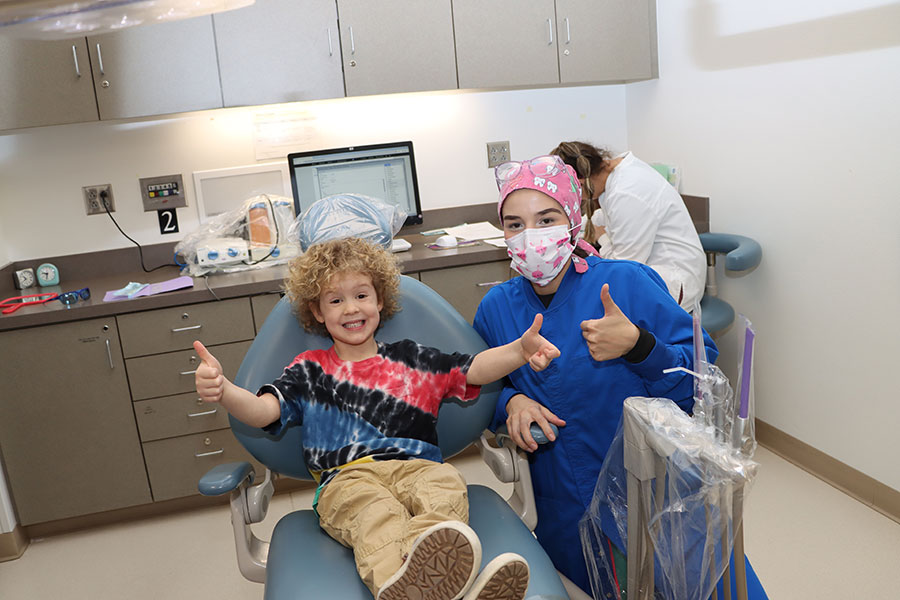Learn what respiratory therapists do, career paths, and how to become a certified respiratory therapist. Discover the career for you with San Juan College.

According to the Bureau of Labor Statistics (BLS), certified respiratory therapists earn over $80,000 annually in the United States, with an associate’s degree as the education requirement. The BLS also predicts that the field will grow faster than the rate of all occupations by 2033. If you’re seeking a healthcare career that offers stability and high starting salaries, learning how to help patients breathe better through respiratory therapy could be your solution.
What Is a Respiratory Therapist?
Respiratory therapists are specialized healthcare professionals who evaluate, diagnose, treat, and care for patients with breathing disorders and cardiopulmonary conditions. They work in diverse healthcare settings, including hospitals, long-term care facilities, home health agencies, rehabilitation centers, and outpatient clinics, serving patients from premature infants to elderly adults.
These skilled practitioners operate medical equipment, administer breathing treatments, and collaborate closely with physicians, nurses, and other healthcare team members to develop and implement comprehensive treatment plans.
What Do They Do?
Respiratory therapists' daily responsibilities are varied and engaging, requiring a blend of technical skills, clinical judgment, and patient interaction. On any given day, a respiratory therapist might:
- Use equipment to assess a patient’s breathing patterns, lung function, and oxygen levels
- Administer aerosol medications and breathing treatments through multiple delivery systems
- Perform chest physiotherapy to help patients clear mucus and improve lung function
- Conduct pulmonary function tests to diagnose respiratory conditions
- Respond to code blue emergencies to assist with cardiopulmonary resuscitation
- Manage mechanical ventilators for patients unable to breathe independently
Other specialty tasks include:
- Conducting sleep studies to diagnose sleep apnea
- Providing pulmonary rehabilitation services to help patients with chronic conditions improve their quality of life
- Administering oxygen therapies for critically ill patients
On the administrative side, tasks include:
- Documenting treatments
- Maintaining detailed patient records
- Communicating with physicians about patient progress and treatment recommendations
- Coordinating care with nursing staff and other healthcare professionals
Work Environment
The work environment for respiratory therapists varies from fast-paced hospital emergency departments to outpatient rehabilitation centers, offering flexibility for different personalities and work-life balance preferences. You can pursue RT work in specialized clinics, emergency departments, community hospitals, home care settings, or large hospitals.
What Is the Career Trajectory?
When you complete training, take a certification test, and become a credentialed respiratory therapist, you can immediately begin work as an RT. After you gain early experience, respiratory therapy provides clear pathways for pursuing professional growth and specialization, regardless of whether you have prior schooling or are changing careers:
Specialties
Respiratory therapists can develop expertise in numerous specialized areas, allowing them to train for more specialties and advance their skills. Depending on the hospital or clinic size, you may work in a separate department or specialize in one type of patient while treating all. Specialization areas within RT include:
- Adult Critical Care Specialty (ACCS)
- Asthma Educator Specialist (AE-C)
- Neonatal/Pediatric Specialty (NPS)
- Pulmonary Function Testing (PFT)
- Sleep Disorders Specialist (SDS)
In addition to these specialty credentials, respiratory therapists can specialize in respiratory care in home care settings, geriatric care settings, or emergency rooms.
Career Advancement Pathways
An associate’s degree in the field is required to become an RT. After you begin working, on-the-job training, experience, and potentially additional education can transform your career trajectory.
Tip: Many community college RT degree programs will feature a direct transfer connection to a four-year bachelor’s degree, allowing you to continue your education in the field and other valuable areas like business, management, and finance.
The field offers multiple routes for professional advancement, such as:
- Clinical Leadership: Experienced therapists can advance to department supervisor or respiratory therapy manager positions, overseeing staff and departmental operations.
- Education and Training: Many respiratory therapists transition into educational roles, teaching in respiratory therapy programs or providing continuing education for healthcare professionals.
- Clinical Research: Opportunities exist in research settings, pharmaceutical companies, and medical device manufacturers to advance respiratory care through clinical trials and product development.
- Medical Sales and Consulting: Experienced therapists can become salespeople for medical equipment companies or consultants for healthcare facilities.
How to Become a Certified Respiratory Therapist
Types of Certifications
Entry into respiratory therapy requires completing an accredited associate degree program and passing national certification examinations. The National Board for Respiratory Care offers two primary credentials:
- Registered Respiratory Therapist (RRT)
- Certified Respiratory Therapist (CRT)
Respiratory therapists can also pursue specialized certifications in neonatal/pediatric care, sleep disorder testing, and pulmonary function technology, enhancing their expertise and career opportunities.
Choosing a Respiratory Therapy School or Program
Selecting the right respiratory therapy program is crucial for success in this rewarding field. Consider these key factors:
- Accreditation: Ensure the program is accredited by the Commission on Accreditation for Respiratory Care (CoARC), which is required for eligibility to take national certification examinations.
- Clinical Experience: Find programs offering extensive hands-on training in diverse clinical settings, where you can be exposed to different patient populations and respiratory conditions.
- Technology and Equipment: Choose programs with modern simulation centers and medical equipment, ensuring you graduate with experience using the technology you'll encounter in your career.
- Faculty Expertise: Research the qualifications and experience of program faculty, as their knowledge directly impacts the quality of your education.
- Transfer Opportunities: Prioritize programs with established pathways to continue your education at the bachelor's level if you're interested in advancement opportunities.
Frequently Asked Questions
Respiratory therapists assist with intubation procedures and may perform intubation in some states and healthcare settings, depending on their training, certification level, and facility protocols. Many respiratory therapists are trained in advanced airway management techniques and work closely with physicians during emergency intubation procedures.
Most healthcare facilities have professional appearance policies that may restrict visible tattoos, though these policies are becoming more relaxed. Generally, tattoos should be covered during patient interactions, and any visible tattoos should be professional and non-offensive. Specific policies vary by employer, so checking with individual facilities about their dress code requirements is best.
Yes, travel opportunities exist in respiratory therapy through travel nursing agencies that place respiratory therapists in temporary assignments nationwide. These positions typically offer higher pay, housing allowances, and the opportunity to experience different healthcare systems and geographic locations while advancing your career.
While most respiratory therapy work requires direct patient contact in healthcare facilities, some remote opportunities exist in case management, equipment companies, insurance review, telehealth consultations, and medical sales. However, most respiratory therapy positions involve hands-on patient care that cannot be performed remotely.
Most respiratory therapists complete an associate degree program from an accredited institution. These programs typically take two to three years to complete and combine classroom instruction with extensive clinical training. Some respiratory therapists pursue bachelor's degrees for advancement opportunities, though an associate degree is sufficient for entry-level positions.
After completing an accredited associate degree program (typically two to three years), graduates are eligible to take the national certification examinations. The certification process itself takes a few months from application to receiving results. Most new graduates begin working as certified respiratory therapists within three to six months of program completion.
Explore Respiratory Therapy Careers at SJC
Becoming a certified respiratory therapist is an excellent choice to make an immediate, meaningful impact in people’s lives and enter the heathcare field with a high starting salary. At San Juan College (SJC), our Associate of Applied Science (AAS) in Respiratory Therapy degree program prepares you to make clinical decisions and care for individuals with acute or chronic illnesses in this rewarding career.
Our CoARC-accredited respiratory therapy degree leads to eligibility for the RRT or CRT credential examination, helping you graduate with the qualifications employers seek. Ready to breathe life into your future? Explore how San Juan College can help you launch a rewarding career in respiratory therapy.



